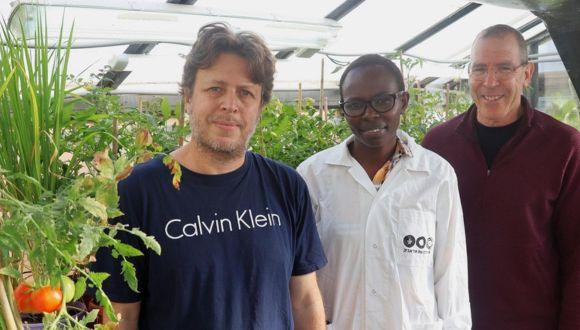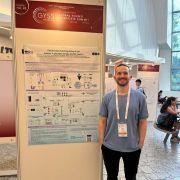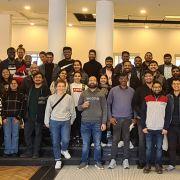International Researcher Helps Innovate Water-Efficient Tomatoes
Team Uses CRISPR Gene Editing to Alter Crop Without Affecting Yield
When Purity Muchoki first joined Tel Aviv University (TAU) as an international master’s student in the plant sciences program, she knew it would be one of the best places for studying food security. This is also why she decided to stay on at TAU to pursue her PhD.
“My background is in crop protection,” says Muchoki, who is originally from Kenya.
“Israel is so well known for its agricultural breakthroughs and technologies, especially in the desert and the hardest of places – that’s why I wanted to come.” — Purity Muchoki
A Breakthrough in Water-Efficient Tomatoes
Recently, Muchoki also had an opportunity to be an integral part of a major food security research advancement at TAU. Working with her co-supervisors Prof. Shaul Yalovsky and Dr. Nir Sade, as well as former postdoctoral fellow Dr. Mallikarjuna Rao Puli, the group were able to grow tomatoes that use less water without affecting yield and quality.
“This directly helps the climate crisis because if you can have production of tomatoes with reduced water needs, and if you can develop them to grow with less water, you’re addressing not just water-use efficiency, but it’s a breakthrough in addressing the global issue of sustainability.”
The team of researchers, who are from TAU’s School of Plant Sciences and Food Security, achieved their results by employing CRISPR genetic editing technology; they targeted a gene known as ROP9, whose elimination caused a partial closure of the stomata, ultimately leading to plants with reduced water loss by transpiration (i.e., the process of water evaporating from a plant’s leaves).
Manipulating the Tomato Plant’s Stomata
While the manipulation of the stomata to reduce a plant’s water loss is not novel, previously closing the stomata has resulted in the reduction of carbon dioxide uptake, which negatively affects plant growth – as carbon dioxide is needed for the production of sugar via photosynthesis.
By using CRISPR technology to edit the ROP9 gene and close the stomata only partially – with the closure mostly happening in the afternoon when the plant’s water loss is greatest, and with the stomata remaining open in the morning and afternoon so the plant can take in enough carbon dioxide – the TAU team were able to avoid any adverse effects on photosynthesis or crop quantity and quality.
Muchoki says the project took about five years. She was primarily responsible for checking the phenotypes, for growing the plants in the greenhouse and the field, and for studying how they behave at a cellular level.
“There was a lot of analysis to see the difference between the mutants and the wild types; we also had to answer the question – when you remove the ROP9 protein, what other proteins are affected … a lot of protein interaction and analysis needed to be done.”
The team additionally worked with researchers from Ben Gurion University and the University of Oregon on the project, and their findings were published in the academic journal Proceedings of the National Academy of Sciences (PNAS).
New Research Horizons
According to Muchoki, the research opens up many new research horizons. “There are so many applications to this research,” she says.
“For instance, tomatoes are in the family of potatoes and eggplants and the ROP9 gene is very close and similar to the genes in those plants – we can employ the same technology to improve other crops and use less water without affecting the yield.”
As for Muchoki’s next steps, she is working on wrapping up her PhD project this year and is pursuing potential postdoctoral opportunities. She would like to eventually establish her own lab, as well as create an agricultural company in Kenya.





